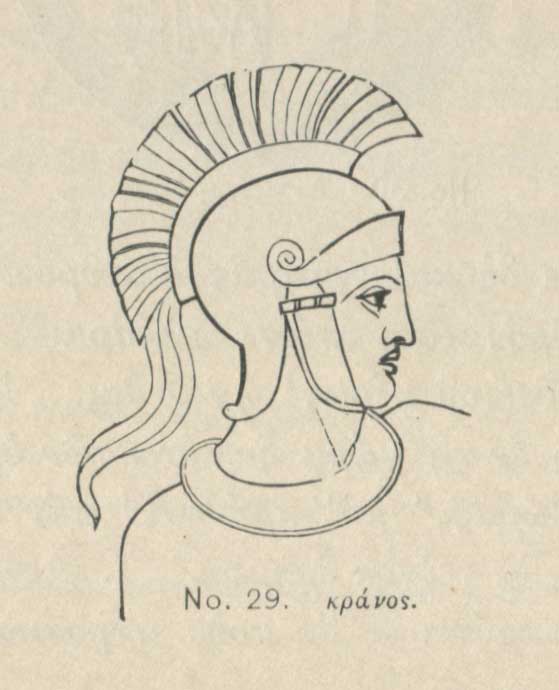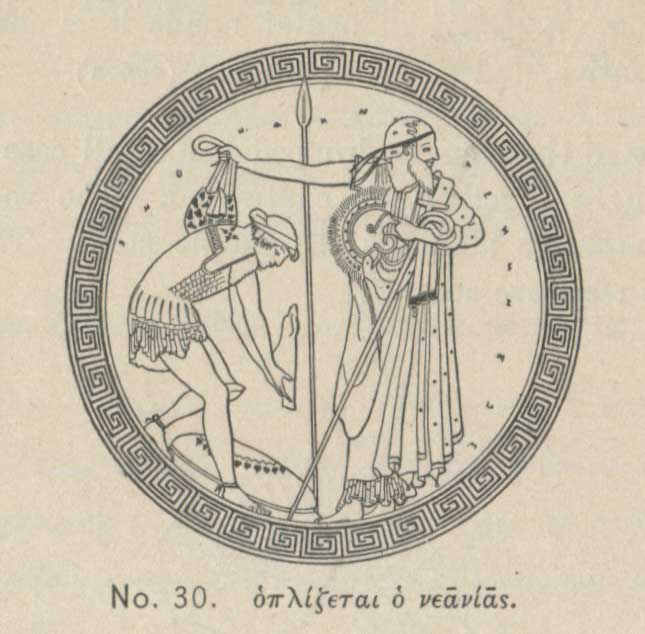THE FIRST GREEK BOOK
BY JOHN WILLIAMS WHITE, PH.D, LL.D., LITT.D.
Professor Of Ancient Greek At Harvard University
This Revision Copyright ©2012 by Shawn Irwin
Lesson XLII - Stems in Stems in σ of the Consonant Declension.
S393. Learn the declension of εὖρος, breadth,
τριήρης, trireme, and κρέας, meat, in 747.
S394. The stem ends in σ (
εὐρεσ, τριηρ, κρεασ). In masculine and feminine nouns ε in the final syllable of the
stem is lengthened to η in the nominative singular (τριήρης); in neuter nouns it is
changed to ο in the nominative, accusative, and vocative singular (εὖρος).
S395. Final σ of the stem is dropped before all case
endings, and the vowels thus brought together are contracted. The vocative singular of masculine and
feminine nouns is the simple stem. The forms τριήροιν and
τριήρων have recessive accent.

S396. VOCABULARY.
ἐπιλείπω, leave behind; intransitive, fail.
εὔρος, ους, τό, breadth width.
κέρας, κέρως and κέρᾱτος, τό, horn of an animal, wing of an army.
κράνος, ους, τό, headpiece, helmet.
κρέας, κρέως, τό, flesh, plural, pieces of flesh, meat.
ὁπλίζω (ὁπλιδ) ὥπλισα, ὥπλισμια ὡπλίσθην, (compare ὅπλον) arm equip.
ὄρος, ους, τό, mountain.
πλέθρον ους, τό, a plethrum a measure of 100 Greek feet.
Σωκράτης, ους, ὁ, vocative Σώκπατες, Socrates the celebrated philosopher.
τεῖχος, ους, τό, wall fort.
Τισσαφέρνης, ους, ὁ, accusative, Τισσαφέρνην voc.
Τισσαφέρνη of A-Declension Tissaphernes.
τριήρης, ους, ἡ trireme, war vessel with three banks of oars.

S397.
1. εἶχε δὲ καὶ τριήρεις ὁ Κῦρος.
2. τοῦτου τοῦ ποταμοῦ τὸ εὖρος ἐστι πέντε πλέθρα.
3. καὶ εκέλευε Κλέαρχον τοῦ δεξιοῦ κέρως ἡγεῖσθαι.
The genitive follows ἡγεομαι, but not ἄγω, which is an important exception to the general rule (847).
4. τὸ δὲ Μένωνος στράτευμα ἤδη ἐν τῇ χώρᾳ ἦν εἴσω τῶν ὀρέων.
The genitive follows the adverb of place (856).
5. ὡπλισμένοι ἦσαν θώραξι καὶ κράνεσι πάντες.
Dative of instrument (866).
6. ἐντεῦθεν ἐπορεύθησαν πρὸς τεῖχος ἔρημον.
7. Ξενοφῶν τὴν ἐπιστολὴν ἔπεμψε Σωκράτει.
8. τοῦ στρανώτᾱς ὁ μὲν σῖτος ἐπέλειπε, κρέα δ᾽ ἔτι εἴχον.
9. ἦν δὲ ταῦτα τείχη, καὶ τὸ μὲν εἶχε Κιλίκων φυλακή,
τὸ δὲ Ἀρταξέρξου ἐλέγετο φυλακὴ φυλάττειν.
In the first sentence, the predicate, ταῦτα is the subject.
τὸ δὲ, the one . . . the other. See 815.
10. ἐπεὶ δὲ ἦσαν επὶ ταῖς θύραις ταῖς Τισσαφέρνους, οἱ στρατηγοὶ παρεκλήθησαν εἴσω.
For the position of the genitive, see 512.
S398.
1. But Menon had the left wing.
2. And Xenophon consults with Socrates.
Dative (865).
3. The generals proceeded through the mountains.
4. They all had helmets of bronze.
5. Thence he sent the messenger upon the mountains.
S399. Great Hardships in the Desert.
οἱ δ᾽ ἐν τούτῳ τῷ τόπῳ ἄνθρωποι ὄνους ἀλέτᾱς παρὰ
τὸν ποταμὸν ὀρύττοντες καὶ ποιοῦντες εις βαρβυλῶνα ἦγον
καὶ ἐπώλουν καὶ ἀνταγοράζοντες σῖτον ἔζων. τὸ δὲ στράτευμα
ὁ σῖτος ἐπέλειπε, καὶ ἀγοράζεσθαι οὐκ ἦν εἰ μὴ ἐν τῇ
Λῡδίᾳ ἀγορᾷ ἐν τῷ Κύρου βαρβαρικῷ. καὶ τίμιος ἦν ὁ
σῖτος. κρέα οὖν ἐσθίουσιν οἱ στρατιῶται. τούτων πολλοὺς
δὲ τῶν σταθμῶν πάνυ μακροὺς ἤλαυνε Κῦρος˙ πολλάκις γὰρ
ἔδει μακρὰν πορεύεσθαι πρὸς χόρτον.
ὄνους ἀλέτᾱς, upper millstones, which were turned sometimes by hand, sometimes by a beast.
ποιοῦντες: by contraction for ποιέοντες
ἔζων: from ζάω. live, be alive.
ἦν was possible.
πολλοὺς, many, accusative plural masculine. The following μακρους modifies this as a predicate adjective, many of
these marches that Cyrus made were very long.
μακρὰν: scilicet ὁδόν, a long way.
See the route on the map.
End Of Chapter
INDEX
Chapter 43
HOME
This Revision Copyright ©2012 by Shawn Irwin

